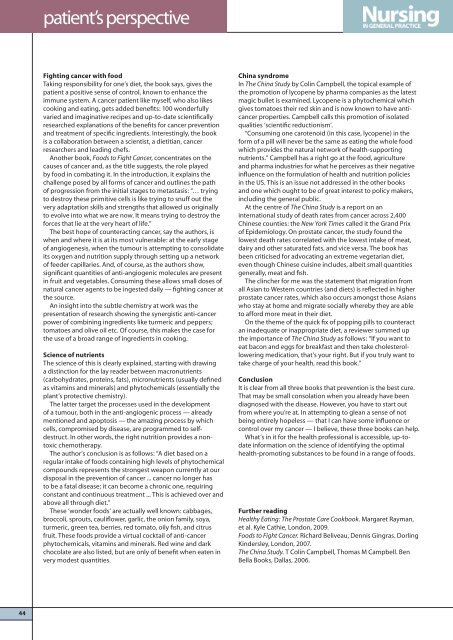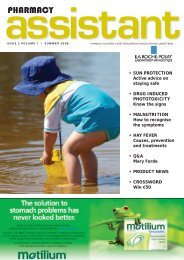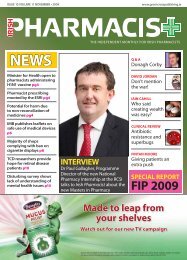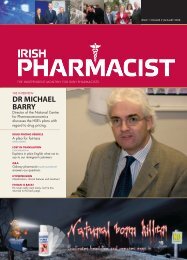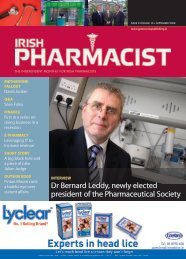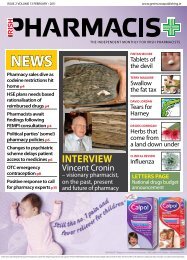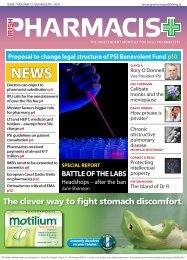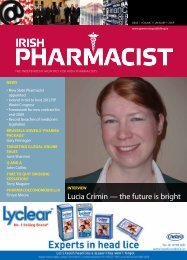veNTIlATIoN - Green Cross Publishing
veNTIlATIoN - Green Cross Publishing
veNTIlATIoN - Green Cross Publishing
You also want an ePaper? Increase the reach of your titles
YUMPU automatically turns print PDFs into web optimized ePapers that Google loves.
44<br />
patient’s perspective<br />
Fighting cancer with food<br />
Taking responsibility for one’s diet, the book says, gives the<br />
patient a positive sense of control, known to enhance the<br />
immune system. A cancer patient like myself, who also likes<br />
cooking and eating, gets added benefits: 100 wonderfully<br />
varied and imaginative recipes and up-to-date scientifically<br />
researched explanations of the benefits for cancer prevention<br />
and treatment of specific ingredients. Interestingly, the book<br />
is a collaboration between a scientist, a dietitian, cancer<br />
researchers and leading chefs.<br />
Another book, Foods to Fight Cancer, concentrates on the<br />
causes of cancer and, as the title suggests, the role played<br />
by food in combating it. In the introduction, it explains the<br />
challenge posed by all forms of cancer and outlines the path<br />
of progression from the initial stages to metastasis: “… trying<br />
to destroy these primitive cells is like trying to snuff out the<br />
very adaptation skills and strengths that allowed us originally<br />
to evolve into what we are now. It means trying to destroy the<br />
forces that lie at the very heart of life.”<br />
The best hope of counteracting cancer, say the authors, is<br />
when and where it is at its most vulnerable: at the early stage<br />
of angiogenesis, when the tumour is attempting to consolidate<br />
its oxygen and nutrition supply through setting up a network<br />
of feeder capillaries. And, of course, as the authors show,<br />
significant quantities of anti-angiogenic molecules are present<br />
in fruit and vegetables. Consuming these allows small doses of<br />
natural cancer agents to be ingested daily — fighting cancer at<br />
the source.<br />
An insight into the subtle chemistry at work was the<br />
presentation of research showing the synergistic anti-cancer<br />
power of combining ingredients like turmeric and peppers;<br />
tomatoes and olive oil etc. Of course, this makes the case for<br />
the use of a broad range of ingredients in cooking.<br />
science of nutrients<br />
The science of this is clearly explained, starting with drawing<br />
a distinction for the lay reader between macronutrients<br />
(carbohydrates, proteins, fats), micronutrients (usually defined<br />
as vitamins and minerals) and phytochemicals (essentially the<br />
plant’s protective chemistry).<br />
The latter target the processes used in the development<br />
of a tumour, both in the anti-angiogenic process — already<br />
mentioned and apoptosis — the amazing process by which<br />
cells, compromised by disease, are programmed to selfdestruct.<br />
In other words, the right nutrition provides a nontoxic<br />
chemotherapy.<br />
The author’s conclusion is as follows: “A diet based on a<br />
regular intake of foods containing high levels of phytochemical<br />
compounds represents the strongest weapon currently at our<br />
disposal in the prevention of cancer ... cancer no longer has<br />
to be a fatal disease; it can become a chronic one, requiring<br />
constant and continuous treatment ... This is achieved over and<br />
above all through diet.”<br />
These ‘wonder foods’ are actually well known: cabbages,<br />
broccoli, sprouts, cauliflower, garlic, the onion family, soya,<br />
turmeric, green tea, berries, red tomato, oily fish, and citrus<br />
fruit. These foods provide a virtual cocktail of anti-cancer<br />
phytochemicals, vitamins and minerals. Red wine and dark<br />
chocolate are also listed, but are only of benefit when eaten in<br />
very modest quantities.<br />
china syndrome<br />
In The China Study by Colin Campbell, the topical example of<br />
the promotion of lycopene by pharma companies as the latest<br />
magic bullet is examined. Lycopene is a phytochemical which<br />
gives tomatoes their red skin and is now known to have anticancer<br />
properties. Campbell calls this promotion of isolated<br />
qualities ‘scientific reductionism’.<br />
“Consuming one carotenoid (in this case, lycopene) in the<br />
form of a pill will never be the same as eating the whole food<br />
which provides the natural network of health-supporting<br />
nutrients.” Campbell has a right go at the food, agriculture<br />
and pharma industries for what he perceives as their negative<br />
influence on the formulation of health and nutrition policies<br />
in the US. This is an issue not addressed in the other books<br />
and one which ought to be of great interest to policy makers,<br />
including the general public.<br />
At the centre of The China Study is a report on an<br />
international study of death rates from cancer across 2,400<br />
Chinese counties: the New York Times called it the Grand Prix<br />
of Epidemiology. On prostate cancer, the study found the<br />
lowest death rates correlated with the lowest intake of meat,<br />
dairy and other saturated fats, and vice versa. The book has<br />
been criticised for advocating an extreme vegetarian diet,<br />
even though Chinese cuisine includes, albeit small quantities<br />
generally, meat and fish.<br />
The clincher for me was the statement that migration from<br />
all Asian to Western countries (and diets) is reflected in higher<br />
prostate cancer rates, which also occurs amongst those Asians<br />
who stay at home and migrate socially whereby they are able<br />
to afford more meat in their diet.<br />
On the theme of the quick fix of popping pills to counteract<br />
an inadequate or inappropriate diet, a reviewer summed up<br />
the importance of The China Study as follows: “If you want to<br />
eat bacon and eggs for breakfast and then take cholesterollowering<br />
medication, that’s your right. But if you truly want to<br />
take charge of your health, read this book.”<br />
conclusion<br />
It is clear from all three books that prevention is the best cure.<br />
That may be small consolation when you already have been<br />
diagnosed with the disease. However, you have to start out<br />
from where you’re at. In attempting to glean a sense of not<br />
being entirely hopeless — that I can have some influence or<br />
control over my cancer — I believe, these three books can help.<br />
What’s in it for the health professional is accessible, up-todate<br />
information on the science of identifying the optimal<br />
health-promoting substances to be found in a range of foods.<br />
Further reading<br />
Healthy Eating: The Prostate Care Cookbook. Margaret Rayman,<br />
et al. Kyle Cathie, London, 2009.<br />
Foods to Fight Cancer. Richard Beliveau, Dennis Gingras. Dorling<br />
Kindersley, London, 2007.<br />
The China Study. T Colin Campbell, Thomas M Campbell. Ben<br />
Bella Books, Dallas, 2006.


